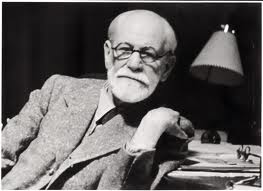
Consider understanding why you behave as you do according to a vision of a man struggling in a horse-driven carriage. According to Freud, the horse is our id (driving us forth with passion), the carriage is the superego (which holds us back) and the man is the ego (negotiating the two). I became fascinated with this metaphor in Psych 101 in college – that got me committed to being a psychologist.
While Freud has been much debated for his views, especially on sexuality, there is no denying that he was brilliant. My training at NYU for my PhD was psychoanalytic and while cognitive-behavior therapy is all the vogue these days, I tell my students they should have a foundation in psychoanalytic theory since you cannot just alter thoughts and actions for lasting change - you must understand basic personality and family dynamics
Another of Freud’s concepts I find valid: life can be understood in terms of two drives: eros (life, love, sex) and thanatos (aggression, death).
And who cannot be fascinated with the unconscious, dream analysis and of course “Freudian slips.”
If you have any fascination with Freud, you must see the play “Freud's Last Session” at the West Side Y in NYC. Two brilliant actors bring to life the two characters – an 83-year old Freud and a 41 year old Oxford professor -- as they banter and debate the question of whether God exists (Freud does not think so), and of course eventually touch upon Freud’s theory of sex as the lens for understanding all of life. Everyone is bisexual, says Freud. Disputing the Bible, he says that no sex before marriage is “not only naïve, it’s mindless cruelty.. Like sending a young man off to perform his first concert with an orchestra when the only times he’s ever played his piccolo was alone in his room!”
What justification for sex before marriage!
And while Freud dodges the question of whether he ever had an affair, yet there have been rumors of dalliance with his sister-in-law.
The young professor is hypothetically C.S. Lewis – the famed author of the masterpiece Chronicles of Narnia (now a movie).
The performances of Martin Raynor as Freud, complete with the gestures and movements of an elderly man, and of Mark H. Dodd as Lewis, reflected their Shakespearean credits. Their timing, inflections, motions and emotions were all so impeccable, smooth, and perfect, making us in the audience think we were observing real people, looking in on Freud’s study in Hampstead, London, in 1939. An air raid startles us, as it does them, and we are riveted to the radio, with reports from {rime Minister Chamberlain announcing news about the war (which Freud doubts will be the war to end all wars…),
I learned some new things about Freud from the play (tho they maybe literary license…). Gods & Goddesses statues sat on Freud’s desk (Buddha, Zeus, Athena, Eros) which -- when challenged as evidence of a belief in God -- he explains as an "interest in ancient belief systems." Freud has two thousand pieces in storage, he says (I wonder how can Freud in 1939 have storage? I thought storage was a thing of the present, as people like me are overcome with stuff, evident in the TV show about hoarding). “I can’t go to a new city without seeking (things) out,” says Freud. I must always have an object to love.” Cleverly, Lewis replies, “Objects are safer than people.”
Also, in the play Freud turns off music on the radio, explaining that he “objects to manipulation" -- that it is like listening to language without knowing what they are saying. I am surprised; I would have suspected Freud would enjoy the reveries and indulgence on fantasy that music can inspire.
Freud was also funny. The character in the play says his dog is his “emotional barometer” – “If a patient is calm, he stretches out at my feet. But if a patient is agitated, Jo-Fi stands at my side and never takes his eyes off him.”
Freud’s favorite joke, he relates in the play, is about the Pastor and the Village Atheist. The Village Atheist was an Insurance Agent. He asked the local Pastor if he could make a sick call. The Atheist’s family was astonished; he was on his deathbed, they couldn’t believe he had the strength to speak with the Pastor, of all people. One day the two men quarreled all night until finally at dawn the weary Pastor stumbled from the house. The Villager had died, still an atheist. But the Pastor was fully insured.
The audience roared with laughter.
The humor is offset by pain. I kept wondering how such a celebrated and brilliant man who changed the face of psychology and history in all ways can live with the critiques and moments of private agony. We never know what people are experiencing every day.
Freud had oral cancer – a cruel twist of fate for a man who brilliantly defined stages of development as oral, anal and phallic. Yet he does not give up cigar smoking – admitting that he is regressing to the oral stage. I knew intellectually that Freud suffered from oral cancer, but his pain becomes emotionally visceral in the play. I also never knew that he considered suicide - or so he says in the play, “I’ll kill myself before the cancer does.”
Another aspect of Freud’s life that has been discussed and debated intellectually is the subtext of his relationship with his daughter Anna and how much it influenced his theories about child sexual development based on the parent-child relationship. In the play, Freud says that he only person permitted to touch his mouth, to help with the prosthesis put in his mouth as a result of surgery that removed his upper palate and jaw and seals off the roof of his mouth from his nasal cavity (but which he embarrassedly says smells) is his daughter Anna -- clearly ripe for Freudian interpretation. And when he answers her phone call, his voice becomes sultry, petulant when he learns she will be late, and thrilled when a subsequent phone call alerts that she is arriving.
Anna presented a professional paper for acceptance into the Psychoanalytic Society, Freud explains in the play, on the topic of sado-masochistic fantasies (an intriguing thought, given the S-M of Hitler), and surprisingly based on her own analysis, by Freud – her father! This all supports how Freud could come up with his theories of sexuality!
In the play Freud tells the professor that Anna never married. In true interpretive style, one of the eminent psychologists I saw the play with, Florence Denmark – equally intrigued and appreciative of the play – noted how Anna never marrying suggests her fixation on her father, suggesting that no man was ever enough in comparison. I note that so many women in real life now can suffer from the same phenomenon, that no man can measure up to daddy’s adoration of her.
Denmark, former President of the American Psychological Association and now a Professor Emeritus at Pace University in NY City and a fellow representative at the United Nations for my organization (the International Association of Applied Psychology) was intrigued with the debated question about whether there is an afterlife. Freud’s clever answer to C.S. Lewis who believes in it: “If you are right, you can tell me I’m wrong, but if I am right, you’ll never know.”
Another psychologist friend who saw the play with me, Tara Pir, noted how the Freud character said that everyone is bisexual. Tir, founder and CEO/Executive Director of the Institute for Multicultural Counseling and Education Services, Inc. in Los Angeles, was touched by the vulnerability and humanness enacted in the Freud character, the variety of the contradictions in his repartee with Lewis, and Freud’s humbleness and acceptance of his fears at the end.
In true Freudian analytic thinking, when Lewis says he feared and detested his father, Freud notes, “A normal father-son dynamic. Childlike adoration turns to realization of his weaknesses, then the desire to displace him.”
I remember doing a TV story when I was a feature news reporter for WCBS-TV on the Oedipal complex, and the five year old son of my husband’s friend Rick Mezan, actually took a bat to his father’s head and said “I’m going to kill you and marry mommy.” Straight out of Freud’s textbook phallic stage!
“I apply the term ‘sexual’ to all interactions that bring pleasurable feelings,” says the Freud character. “Genital contact, an infant suckling at its mother’s breast or the delight of a four year old girl sitting at her father’s knee. Sexuality is the font of all happiness.”
Pir treated us to a script, with signatures of the actors and playwright, Mark St. Germain, with proceeds going to Broadway Cares. It allowed me to check back into the joke
We all know about Freudian slips – how things we say supposedly accidentally reveal truth. A great quote related to communication from the play: "What people say is less important than what they cannot."
 Monday, May 30, 2011 at 01:20AM
Monday, May 30, 2011 at 01:20AM 





